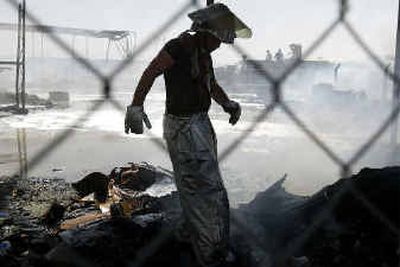Another airstrike targets terrorist leader al-Zarqawi

BAGHDAD, Iraq – The U.S. military launched another airstrike early today against a suspected hideout of terrorist mastermind Abu Musab al-Zarqawi in Fallujah. It was the fourth attack this month against targets in the city.
Brig. Gen. Mark Kimmitt, deputy operations director for the multinational force, said the attack was carried out after “multiple confirmations of Iraqi and multinational intelligence.”
His statement gave no further details, but residents contacted by telephone said U.S. jets fired missiles at a house on the eastern side of the city. A doctor said four people were killed and 10 were injured.
The attack came hours after insurgents fired mortar rounds at a U.S. base on the outskirts of Baghdad’s airport, wounding 11 soldiers and starting a fire that burned for over an hour.
That attack, along with a car bomb that exploded outside a police headquarters in Samawah, 150 miles south of the capital, added to the evidence that insurgents have no plans of letting up attacks – even after U.S. coalition authorities handed over sovereignty to an interim Iraqi government on Monday.
With the end of the occupation, about 160,000 foreign troops, mostly American, remain in Iraq to provide security and train Iraq’s new security services. U.S. officials have warned that the transfer of sovereignty would not stop assaults.
Kimmitt provided no further details about the attack in Fallujah, which is believed to have become a stronghold of al-Zarqawi’s Tawhid and Jihad movement since U.S. Marines lifted their three-week siege of the city in April and handed security over to a locally raised force commanded by officers from Saddam Hussein’s army.
Residents say the city is now under the control of radical clerics and their armed followers. The Tawhid and Jihad movement claimed responsibility for the beheading of American Nicholas Berg and South Korean Kim Sun-il.
Meanwhile, police slapped a 9 p.m. to 6 a.m. curfew on the Shiite holy city of Najaf on Wednesday, a day after discovering about 150 pounds of explosives in a white BMW, police Brig. Ghalib al-Jazaari said.
One Libyan man who allegedly entered Iraq from neighboring Syria to fight U.S. forces was detained in connection with the incident, al-Jazaari said.
The police chief also said militiamen loyal to radical cleric Muqtada al-Sadr kidnapped 25 policemen Tuesday in Najaf, 100 miles south of Baghdad, in response to the arrest of two of their colleagues but released 16 of them on Wednesday.
Ahmad al-Shibani, an al-Sadr spokesman, confirmed the kidnappings, but said all 25 had been freed. “We just wanted to teach them a lesson,” he said.
Guerrillas fired at least 10 mortar rounds at the logistics base on the edge of Baghdad’s airport at about 8:15 a.m., said Lt. Col. Richard Rael, their commander. The base is operated by the New Mexico Army National Guard’s 515th Corps Support Battalion.
“We’re OK,” Rael said. “We’ll get back to business as usual.”
Black smoke hung over the airport for an hour after one of the 82 mm mortar rounds struck a petroleum products yard. The fire caused no injuries.
The base has been subject to almost daily mortar attacks, but this was the first time the attacks caused significant casualties and damage.
Two people were wounded in the car bombing in Samawah, which set two other vehicles ablaze, a hospital official said.
Separately, a 1st Armored Division soldier was killed and four others were injured during a traffic accident near the Kuwait border on Wednesday night, the U.S. military said. The accident was non-combat related, the military said.